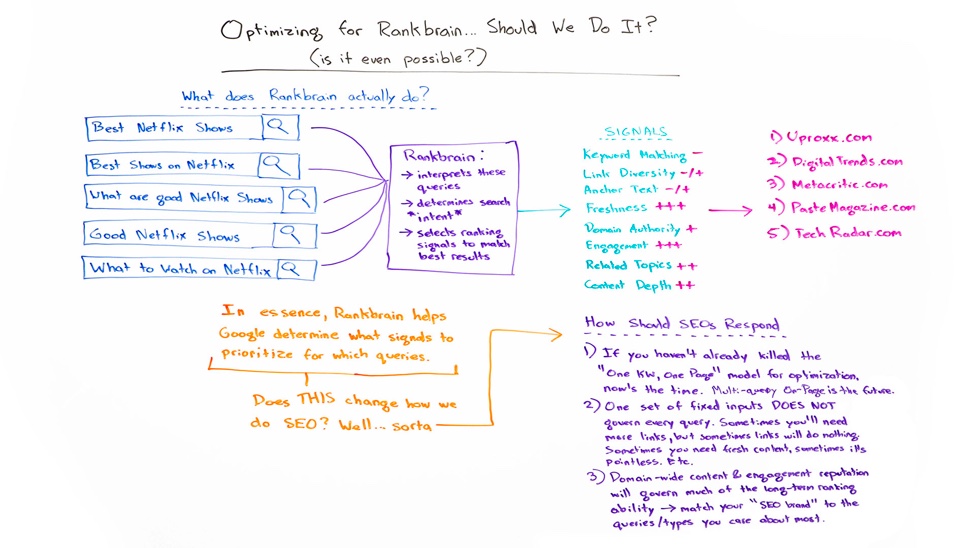Google RankBrain Update | Search Engine Optimization Tips
 In case you haven’t heard, the top three Google SEO ranking factors are links, content, and RankBrain. In a recent Google Q&A Chat, Andrey Lipattsev, Search Quality Senior Strategist at Google Ireland, said that content and links were the two most important factors (in no order), followed by RankBrain as the third most important signal (with the caveat that this position is “hotly contested”).
In case you haven’t heard, the top three Google SEO ranking factors are links, content, and RankBrain. In a recent Google Q&A Chat, Andrey Lipattsev, Search Quality Senior Strategist at Google Ireland, said that content and links were the two most important factors (in no order), followed by RankBrain as the third most important signal (with the caveat that this position is “hotly contested”).
We know that content and links are crucial, but what’s RankBrain?
What We Know About Google RankBrain
RankBrain is an artificial intelligence machine-learning system that is just one SEO signal from the overall search engine algorithm called Hummingbird — Google’s attempt to understand searcher queries on a human level.
RankBrain takes your queries and then interprets them in a way a human would. We aren’t entirely sure how it works, but it tries to interpret the intent behind the query and then serve up the most appropriate results.
Source: Search Engine Land
Bloomberg first broke the story in October 2015, but since then a lot more information has been gathered. The most recent RankBrain updates came from Larry Kim (Wordstream Founder) and Rand Fishkin’s Whiteboard Friday (Moz), Optimizing for RankBrain… Should We Do It? (Is It Even Possible?)
Key Takeaways:
1. RankBrain is a query interpretation model that involves determining searcher intent.
2. After determining the searcher’s intent, the algorithm then prioritizes different ranking factors, such as:
- Keyword Matching
- Link Diversity
- Anchor Text
- Freshness
- Domain Authority
- Engagement
- Related Topics
- Content Depth
3. Depending on the query, Google’s algorithms will weight each ranking signal accordingly.
4. Fishkin used a Netflix show search query, triggering RankBrain to prioritized “freshness” and “engagement” over everything else.
Essentially, Google RankBrain helps Google interpret searcher queries and determines which ranking signals to use and how to weight those signals.
Here is Fishkin’s Whiteboard that shows which query he tested (Netflix shows) and which signals RankBrain chose to prioritize (freshness and engagement):
Source: moz.com
In Rand Fishkin’s example search for the “best Netflix shows,” he demonstrates that “freshness” is most important:
- Keyword matching is not that important. So minus that, not super important here.
- Link diversity, neither here nor there.
- Anchor text, it doesn’t matter too much, neither here nor there.
- Freshness, very, very important.
The results the Netflix query produced led Fishkin to conclude that RankBrain was prioritizing freshness and engagement over other ranking signals, such as links and keyword matching.
Fishkin’s main question is how SEOs can optimize for RankBrain, if that’s even possible. The short answer is no, but it may have to deal with how the question is framed.
Does This Change the Way We Do SEO?
Not really, but there are a couple of things to keep in mind:
1. Kill the idea of one keyword, one page. Condense content to all intents surrounding one topic/idea. Don’t have multiple URLs that answer the same question. It’s best to have one page that targets all searcher intents around a single topic.
2. Some queries demand different signals in proportion to others. Sometimes you will need lots of links with anchor text, sometimes not. Sometimes fresh content will supersede other factors, sometimes not. Have content match the ranking factor you deem most important.
3. Reputation as a website (domain authority). Match your SEO focus to the queries that you care about most.
4. Establish and build that trust over time with engaging UI, UX, and branding.
5. Help Google to better understand your website and web pages with natural language and whitehat SEO strategy.
6. Since Google algorithms are trying to become more and more “human,” stick to trying to satisfy the user. Anticipate the searcher’s goal and then create content that satisfies that desire.
RankBrain might shift our focus a little bit, but it hasn’t changed the basic principles behind a good SEO strategy:
- Create quality content that matches your business.
- Optimize URLS, title tags, and onsite SEO.
- Be consistent, interesting, and engaging.
- Focus on people and user experience over search engines.
- Make sure your site is mobile-friendly.
- Have a blog and promote it.
- Consider guest blogging for other websites.
- Link to internal and external pages in your content.
- Address common questions, objections, and customer feedback.
- Solve industry-related questions and problems that customers face.
- Follow the latest SEO best practices and stay up-to-date on Google algorithm changes.
- Focus on great content, great sales copy, and great offers.
Top SEO Ranking Factors for 2017
- Content
- Links
- RankBrain
- Engagement and Traffic
- Page Titles
- Local Optimization
- Page Layout, Coding, and Navigation
- Backlink Profile
- Keyword Matching (title, content, anchor links, alt attributes, image name etc.)
- Related keywords/topics targeting
- Freshness (publication date)
- Content Formatting
- Click-Through-Rate (CTR)
- Website Engagement Rates
- Social Media Metrics
The chart below highlights the most significant SEO factors:
 Source: searchengineland.com
Source: searchengineland.com
How Can Your Site Get Penalized?
Google Panda
Checks for content quality, blog comments, social links, low ad ratio, privacy, over optimization, and logins.
Google Penguin
Checks for link schemes, keyword stuffing, over optimization, and unnatural links.
Google Pigeon
Checks for local listing information, sitemap submission, knowledge graph style results, reputation, authority, and advertisements on page.
Google RankBrain
Uses artificial intelligence to interpret searcher queries and deliver results with weighted ranking factors.
See a timeline of Google algorithm changes here.
Tactical Keyword Research in A RankBrain World from Peter “Dr. Pete” Meyers
What Does It All Mean?
Like Facebook, Twitter, and other search engines, Google uses machine learning to help serve the most relevant content to you. This is a trend that will only increase in the coming years.
Here are some of our predictions for the future of SEO, although some of them are already in their infant stages:
- Expect frighteningly good responses to your search queries. Your social media and search engine feeds will continue to gather information on you, perhaps understanding your brain and personality better than your friends, family, and perhaps even yourself.
- Mobile search has already surpassed desktop searches. Expect a continued emphasis on mobile search.
- Google and other search engines will pull answers from your content. Learn how to improve your chances of showing up in Google Answer Boxes.
- If you are targeting audiences in other countries, make sure you translate your content.
- Expect an increase in rich snippets and knowledge graphs.
- Google Penguin and Panda will operate in real-time.
- Social media signals will increase in importance.
- HTTPS will continue to get prioritized over HTTP (the “s” stands for “secure”).
- Search engines will continue to serve more specific results. As queries get longer and more specific, search engine results put more emphasis on delivering results that answer queries directly.
If you have any questions about RankBrain specifically or SEO generally, don’t hesitate to contact us for a free walkthrough demonstration of our services.
Call VitalStorm for your free consultation: 1-877-311-5695
Check us out on Facebook, Twitter, and Google+ for more useful digital marketing information.


